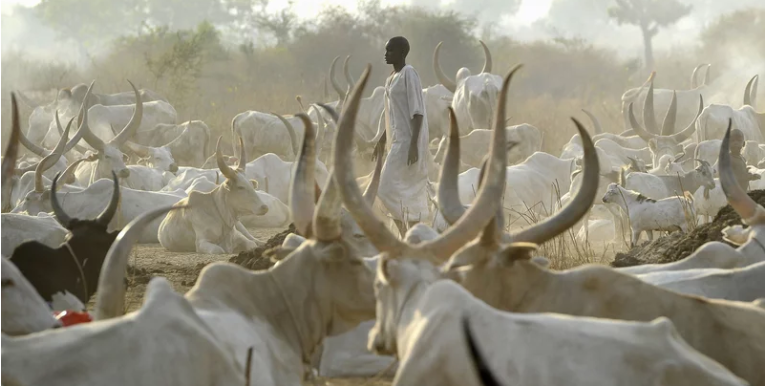Local authorities in Eastern Equatoria State have confirmed that pastoralists from Bor on Monday started repatriating their cattle from Magwi County to Jonglei State after a two-day meeting between the host communities and the herders. The meeting was chaperoned by the country’s security chiefs.
On Sunday, security chiefs from Juba comprising National Security Director Gen. Akol Koor, Police boss Gen. Majak Akech and SSPDF Chief Gen. Santino Deng Wol traveled to Nimule to resolve the conflict between the pastoralists and the herders.
The meeting was also attended by the Bor County commissioner, community leaders, and lawmakers representing Bor in the national assembly while the Eastern Equatoria State, Governor Louis Lobong, clad in military attire, led his team comprising some members of his state cabinet and the Magwi County commissioner.
On Tuesday last week, an attack on a cattle camp of herders from Bor in Mugali Payam in Magwi County left over 35 people dead, including children, women, and the elderly, 19 others injured and thousands of cattle stolen.
In what was seen as a revenge attack, last Thursday, cattle herders shot dead two police officers in Nimule town. One of the suspects was arrested and is currently detained at the Nimule police station. The chaos and resultant trepidation led to the temporary closure of the Nimule border.
Magwi County Commissioner David Otto Remson on Monday evening confirmed the repatriation of cattle to Jonglei State and said the state government and the local community assured the pastoralists of security on their way home.
“All of us resolved, as the way forward, that the cattle must evacuate the Magwi area. The Bor community also accepted that if the (cattle) is a problem to the locals, it is important for all cattle in Magwi to be evacuated to Bor and they immediately started it (moving) yesterday (Sunday),” he said. “The cows are ferried by trucks and they asked if the government can avail trucks and any other assistance.”
Commissioner Otto urged the pastoralists who cannot afford to hire trucks to start moving on foot.
“We also agreed that those who cannot afford to hire trucks move on land (foot). They can start going and we assured them of security on the road,” he said. “The community of Magwi should also be vigilant and nobody should disturb the herders on the way to Bor.”
The secretary-general of the Jonglei cattle keepers in Magwi, Abraham Makur, confirmed to Radio Tamazuj Monday evening that they have been evacuating cattle since March but have consistently been disturbed by cattle rustlers.
“We are repatriating our cattle and the government has seen what is going on and the vehicles are moving on the road carrying cattle out of Nimule. This is what was agreed and came out of the meeting of today (Monday),” he said.
Makur however decried the attacks on their camps and said he believed that a citizen could settle in any part of the country.
“The community of Bor was thinking they are South Sudanese and can stay anywhere but due to this aggression done by the people of Eastern Equatoria it has given the people a different view,” he said. “They (pastoralists) have been killed miserably their cattle taken. Even though their people have been killed, they have nothing to do because they are vulnerable and the only thing is for those still alive to take out their cattle.”
He added: “Those who were killed have died in vain. No one will take care of them.”
Makur said that by the end of July the Bor pastoralists will have completed repatriating all their cattle from Magwi. He however said hiring trucks to transport the cattle was expensive and some pastoralists cannot afford it.
For his part, Eastern Equatoria State Governor Louis Lobong strongly urged the host community to stop allowing cattle raiders to disturb the herders as the latter were now implementing an exit strategy.
He also said those people saying that the communities in Eastern Equatoria do not like people from Bor are wrong and should desist.
“Someone said we do not want people here. Do you know that half of the population of the Dinka Bor is in Eastern Equatoria right from Nadapal up to here (Nimule)” Who has been chased?” Governor Lobong asked. “So, do not say such statements. What I want to tell you is that learn how to interact with other communities. You cannot go and occupy one place. This is not how a town should be. We have plots and everyone selects a plot and your neighbor should not be necessarily from your tribe. That is what we want.”
He said the Constitution of South Sudan states clearly that every citizen can stay anywhere he wants “but not any tribe will go and stay anywhere”.
“It (constitution) says anybody, you as individuals, maybe you decide with your family to stay anywhere you want. Not because I have fought here and I have to stay here,” Governor Lobong charged. “Such statements are what Equatorians and the people Nimule do not like. This country was liberated by blood. Whose blood did not pour here?”




